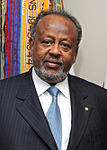2003 Djiboutian parliamentary election
| |||||||||||||||||||||||||
All 65 seats in the National Assembly | |||||||||||||||||||||||||
|---|---|---|---|---|---|---|---|---|---|---|---|---|---|---|---|---|---|---|---|---|---|---|---|---|---|
| |||||||||||||||||||||||||
 |
|---|
|
|
|
|
Parliamentary elections were held in Djibouti on 10 January 2003 to elect the National Assembly of Djibouti. The ruling coalition of President Ismail Omar Guelleh won all 65 seats in the election, defeating an opposition coalition.
The elections were the first in which women were elected to parliament after a new law was passed requiring a minimum of 10% male or female candidates in candidate lists.[1][2]
Background[edit]
After being a one-party state from 1977 to 1992, limited opposition was allowed in the previous two parliamentary elections. However, the 1997 elections still saw supporters of President Guelleh win every seat in Parliament. The situation was changed for the 2003 elections, with a law that had previously restricted the number of political parties to four expiring, and full multi-party democracy was allowed.[3]
Electoral system[edit]
Members of the National Assembly were elected from five constituencies with different numbers of seats.[4] In each constituency, the party or coalition with the most votes won all of the seats in the constituency.[4]
Campaign[edit]
The elections were contested between two coalitions.[5] The ruling Union for a Presidential Majority led by Prime Minister Dileita Mohamed Dileita comprised the parties People's Rally for Progress, Front for Restoration of Unity and Democracy, National Democratic Party and the Social Democratic People's Party.[5] They were opposed by the Union for a Democratic Alternative (UAD) coalition led by a former Prime Minister Ahmed Dini Ahmed.[5] The UAD consisted of the Republican Alliance for Democracy, Movement for Democratic Renewal and Development, Djibouti Party for Development and the Djibouti Union for Democracy and Justice.[5]
Five of the parties in these coalitions were new, having been formed after the law restricting the number of political parties had expired.[3] The opposition alliance was hurt by the decision of Aden Robleh Awaleh and his National Democratic Party to move from the opposition to being a member of the government coalition.[2] Government supporters attacked the opposition leader Ahmed Dini Ahmed for his previous role as a leader of the Front for the Restoration of Unity and Democracy during the Djiboutian Civil War in the early 1990s.[3] The Union for the Presidential Majority called for voters to support them so they could continue to bring economic development to Djibouti and to reduce poverty and unemployment.[1] Meanwhile, the opposition criticised the government's record, accusing it of numerous failures and called on voters to bring political change to Djibouti.[3][1]
Results[edit]
The results saw the Union for the Presidential Majority win all of the seats in the Djibouti parliament after topping the vote in all five constituencies.[2] The opposition came closest to winning seats in the capital Djibouti city where they won just short of 45% of the vote.[2] The election saw seven women – Hawa Ahmed Youssouf, Ismahan Abdi Douksieh, Hasna Hassan Ali, Mariam Ibrahim Farah, Kadidja Mohamed Ali, Hasna Mohamed Dato and Aïcha Mohamed Robleh – elected to parliament for the first time.[1][6]
International election monitors generally praised the election saying that "the electoral operations have been free from irregularities".[1] However the opposition denounced the results saying that they were fraudulent and that there had been ballot stuffing, multiple voting and some voting cards had not been distributed.[4] The opposition leader Dini said he would take their case to the constitutional court, but called on his supporters to not launch street protests.[1][2]
 | |||||
|---|---|---|---|---|---|
| Party | Votes | % | Seats | +/– | |
| Union for the Presidential Majority | 52,411 | 62.40 | 65 | 0 | |
| Union for a Democratic Alternative | 31,581 | 37.60 | 0 | 0 | |
| Total | 83,992 | 100.00 | 65 | 0 | |
| Valid votes | 83,992 | 98.19 | |||
| Invalid/blank votes | 1,548 | 1.81 | |||
| Total votes | 85,540 | 100.00 | |||
| Registered voters/turnout | 178,799 | 47.84 | |||
| Source: African Elections Database | |||||
References[edit]
- ^ a b c d e f "Djibouti: parliamentary elections Assemblée nationale, 2003". Inter-Parliamentary Union. Retrieved 30 May 2009.
- ^ a b c d e "President's backers win Djibouti poll". BBC. 11 January 2003. Retrieved 30 May 2009.
- ^ a b c d "Djiboutis to vote Friday in Parliamentary polls". Middle East Online. 9 January 2003. Archived from the original on 3 November 2016. Retrieved 29 May 2009.
- ^ a b c "Djibouti opposition: official poll results rigged". Middle East Online. 13 January 2003. Archived from the original on 24 April 2005. Retrieved 29 May 2009.
- ^ a b c d "Election Profile for Djibouti". ElectionGuide. Retrieved 29 May 2009.
- ^ Daher Ahmed Farah (2018) Savoir et pouvoir dans le contexte de Djibouti : des configurations éducatives entre constructions de savoir et relations de pouvoir CNAM

